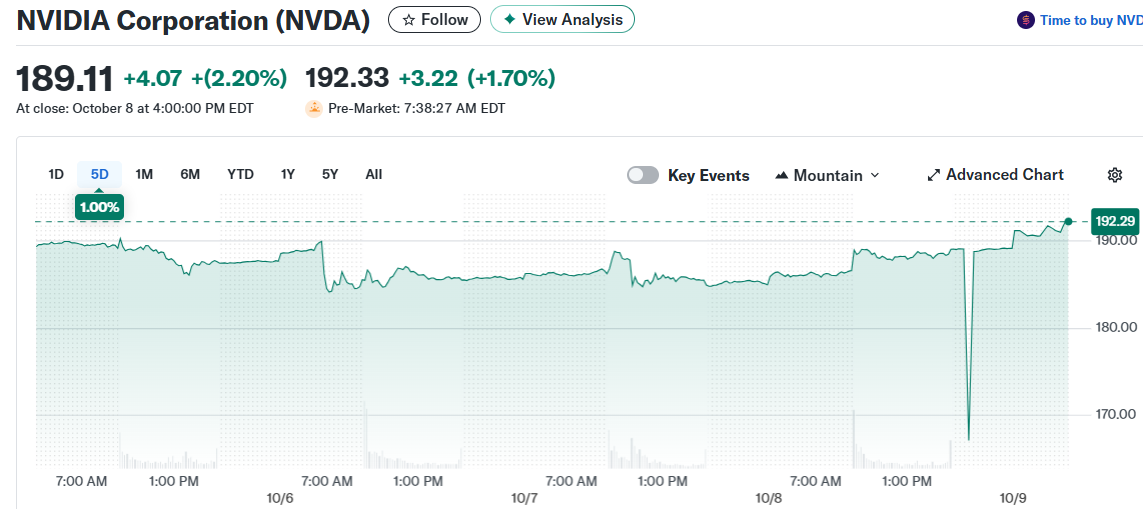TLDR
- Nvidia invests $2 billion in xAI’s $20 billion funding round through equity stake
- CEO confirms “really, really high” demand for Blackwell GPU processors
- Company partners with OpenAI to deploy 10 gigawatts of AI data centers
- Q2 earnings hit $1.05 per share on $46.74 billion revenue, beating forecasts
- Stock gained 2.20% to close at $189.11 on Wednesday
Nvidia shares jumped Wednesday after CEO Jensen Huang confirmed the chipmaker’s role in Elon Musk’s xAI artificial intelligence venture. The stock closed at $189.11, marking a 2.20% gain.

The company is putting up to $2 billion into xAI’s $20 billion fundraising effort. The financing includes roughly $7.5 billion in equity and up to $12.5 billion in debt.
The deal allows xAI to buy Nvidia’s advanced GPUs for its Colossus 2 data center in Memphis. A special purpose vehicle will purchase the hardware and lease it to xAI over five years.
Valor Capital leads the equity portion while Apollo Global Management and Diameter Capital Partners handle the debt side. The structure lets investors earn returns through chip rentals with GPUs backing the debt.
Strong GPU Demand Continues
Huang told CNBC that Blackwell GPU demand remains “really, really high.” His remarks came as AMD announced its own OpenAI partnership Monday.
Nvidia’s September agreement with OpenAI calls for deploying at least 10 gigawatts of AI data centers using Nvidia processors. AMD will supply 6 gigawatts of OpenAI’s infrastructure with its graphic processing units.
Evercore ISI lifted its Nvidia sales forecast by $5.5 billion for late 2026. The firm raised its price target from 214 to 225.
Bank of America expects the OpenAI investment to return three to five times the initial amount. Some analysts worry about Nvidia funding startups that become customers for its chips.
xAI’s monthly costs approach $1 billion as it builds out AI infrastructure. The company pulled in about $10 billion through debt and equity earlier this year.
China Operations Face Scrutiny
Huang said the U.S. isn’t “far ahead” of China in AI despite superior models. He pointed to China’s edge in energy, open-source models and consumer AI tools.
Nvidia shares dropped in mid-September after reports that China’s Cyberspace Administration told tech firms to stop buying Nvidia AI chips. Chinese regulators are reviewing whether Nvidia violated antitrust rules with its 2020 Mellanox Technology purchase.
The company secured a license in August to sell H20 AI chips in China. The deal requires Nvidia to give the U.S. government 15% of China chip revenue.
Nvidia ordered 300,000 H20 chips from Taiwan Semiconductor to add to its 600,000 to 700,000 chip inventory. The company sold roughly 1 million H20 chips in 2024, per SemiAnalysis data.
Earnings Beat Expectations
Fiscal Q2 earnings reached $1.05 per share versus the $1.01 estimate. Revenue of $46.74 billion topped the $46.05 billion forecast.
The company recorded zero H20 chip sales from China and excluded H20 revenue from its Q3 outlook of $54 billion. Analysts had projected $53.43 billion.
Nvidia announced a $60 billion stock buyback program. The company hit a $4 trillion market cap in July, surpassing Apple and Microsoft to become the most valuable public company.





